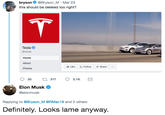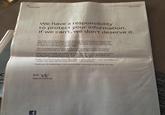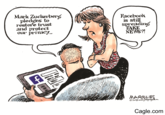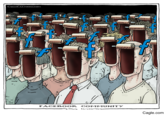Cambridge Analytica Facebook Controversy
Confirmed 15,241
Part of a series on 2016 United States Presidential Election. [View Related Entries]
Cambridge Analytica Facebook Controversy
Part of a series on 2016 United States Presidential Election. [View Related Entries]
Overview
Cambridge Analytica Facebook Controversy refers to an ongoing accusation that the data mining and analysis firm Cambridge Analytica harvest information from more than 50 million Facebook profiles without the permission of the users. The company used this information to build software that could predict and influence the political opinions in favor of then-presidential nominee Donald Trump during the 2016 Presidential election.
Background
On December 15th, 2017, the Wall Street Journal[3] reported that Special Counsel Robert Mueller requested that Cambridge Analytica turn over documents connect to President Donald Trump's campaign in his investigation into Russian interference in the 2016 U.S. election.
On March 17th, 2018, in a series of interviews with The New York Times and the Guardian, former employee and whistleblower Christopher Wylie said that using money from Republican and Trump donor Robert Mercer and former White House advisor Steve Bannon, the data mining firm Cambridge Analytica harvested private information from more than 50 million Facebook users without their permission.[1][2]
The Times report that in 2014, while working for Strategic Communication Laboratories (SCL), the parent company of Cambridge Analytica, Wylie found that researchers at Cambridge University's Psychometrics Centre developed a way to map personality traits based on what users liked on Facebook. They continued:
" The researchers paid users small sums to take a personality quiz and download an app, which would scrape some private information from their profiles and those of their friends, activity that Facebook permitted at the time. The approach, the scientists said, could reveal more about a person than their parents or romantic partners knew -- a claim that has been disputed."
However, when the University refused to work with the firm, Wylie enlisted Dr. Aleksandr Kogan, a Russian-American academic, to build his own version of the technique, pulling more than 50 million users information without their permission. Of those users, Dr. Kogan could build "psychographic profiles" of about 30 million users, while only about 270,000 who participated had given consent. They wuld then use that informaiton to build specific digital advertisements on Facebook.
According to Wylie, once users sign up for the app, they participate in quiz that helps build the profile. He said, "It’s sort of like the digital shadow of yourself. So, when you think about what you do on social media, you curate your identity, so when you like things, when you follow things, you reveal all these little clues and if we have enough of those clues, we can start to develop a portrait of who you are."
After the activity was discovered by Facebook in 2015, the social media company was told that the information was destroyed.
Development
Facebook's Response
On March 16th, 2018, Facebook announced that they would be suspending Startegic Communication Laboratoris (SCL), who owns Cambridge Analytica from the platform. They wrote in a statement:[4]
Kogan requested and gained access to information from people after they chose to download his app. His app, “thisisyourdigitallife,” offered a personality prediction, and billed itself on Facebook as “a research app used by psychologists.” Approximately 270,000 people downloaded the app. In so doing, they gave their consent for Kogan to access information such as the city they set on their profile, or content they had liked, as well as more limited information about friends who had their privacy settings set to allow it.
Although Kogan gained access to this information in a legitimate way and through the proper channels that governed all developers on Facebook at that time, he did not subsequently abide by our rules. By passing information on to a third party, including SCL/Cambridge Analytica and Christopher Wylie of Eunoia Technologies, he violated our platform policies. When we learned of this violation in 2015, we removed his app from Facebook and demanded certifications from Kogan and all parties he had given data to that the information had been destroyed.
Zuckerberg's Response
On March 21st, Facebook founder and CEO Mark Zuckerberg posted an explanation of Facebook's relationship with Aleksandr Kogan and Cambridge Analytica on the website.[18] In the post, Zuckerberg promised to "investigate all apps that had access to large amounts of investigate all apps that had access to large amounts of information before we changed our platform to dramatically reduce data access in 2014, and we will conduct a full audit of any app with suspicious activity." Additionally, he said that Facebook would restrict developers' access to data and help users understand which apps have access to user data. The post received more than 174,000 reactions, 26,000 comments and 54,000 shares in 24 hours.
Following the release of the post, people online criticized Zuckerberg for not apologizing for the data breach (examples below).



Later that day, Zuckerberg appeared on CNN and formally apologized for the data breach. In the interview, he laid out what happened to allow this type of breach and what Facebook would be doing in the future to prevent this type of problem. The post (shown below) received more than 177,000 views in less than 24 hours.
Meanwhile, The Onion[19] published a satirical article titled "Mark Zuckerberg Promises That Misuse of Facebook User Data Will Happen Again and Again."
On March 25th, Zuckerberg took out full page advertisements in newspapers in the United States and the United Kingdom apologizing for the leak, including The New York Times, The Washington Post, The Observer, The Sunday Times and more.[21] He wrote:
"We have a responsibility to protect your information. If We can't, we don't deserve it.
"You may have heard about a quiz app built by a university researcher that leaked Facebook data of millions of people in 2014. This was a beach of trust, and I'm sorry we didn't do more at the time. We're now taking steps to make sure this doesn't happen again."

Audit Results
On May 14th, 2018, Ime Archibong, Facebook's Vice President of Product Partnership, posted an update on the Facebook blog [29]regarding their app audit, which was announced during Zuckerberg's initial response to the Cambridge Analytica controversy. After investigating thousands of apps, they had suspended "around 200." They wrote that when they find evidence that the application had misused data, Facebook ban them and notify the affected user, using a specialty page on Facebook.[30]
Archibong wrote:
"We have large teams of internal and external experts working hard to investigate these apps as quickly as possible. To date thousands of apps have been investigated and around 200 have been suspended -- pending a thorough investigation into whether they did in fact misuse any data. Where we find evidence that these or other apps did misuse data, we will ban them and notify people via this website. It will show people if they or their friends installed an app that misused data before 2015 -- just as we did for Cambridge Analytica."
Cambridge Analytica CEO "Honey Pot" Video
On March 19th, 2018, Channel 4 News in Britain aired a hidden camera interview with Cambridge Analytica CEO Alexander Nix speaking to a "perspective client" who was actually a Channel 4 reporter. During the course of the interview, he discusses that the company has used bribes, false credentials and sex workers to land campaigns.
"Many of our clients don’t want to be seen to be working with a foreign company,” Nix told the reporter. “We can set up fake IDs and websites, we can be students doing research projects attached to a university, we can be tourists. There’s so many options we can look at."
He also said that "They will offer a large amount of money to the candidate, to finance his campaign in exchange for land for instance. We'll have the whole thing recorded on cameras."
Additionally, he said the firm could "send some girls around to the candidate’s house -- we have lots of history of things[…]I’m just saying, we could bring some Ukrainians in on holiday with us you know. You know what I’m saying."[5]
Cambridge Analytica's Response
In a statement made on March 19th, Cambridge Anayltica[10] said:
"Cambridge Analytica strongly denies the claims recently made by the New York Times, the Guardian and Channel 4 News.
The company’s detailed responses to their questions ahead of publication were largely ignored in their subsequent reporting. Their source is a former contractor for Cambridge Analytica – not a founder as has been claimed – who left in 2014 and is misrepresenting himself and the company throughout his comments.
In 2014 we received Facebook data and derivatives of Facebook data from another company, GSR, that we engaged in good faith to legally supply data for research. After it subsequently became known that GSR had broken its contract with Cambridge Analytica because it had not adhered to data protection regulation, Cambridge Analytica deleted all the Facebook data and derivatives, in cooperation with Facebook.
This Facebook data was not used by Cambridge Analytica as part of the services it provided to the Donald Trump presidential campaign; personality targeted advertising was not carried out for this client either. The company has made this clear since 2016."
Following the hidden camera interview, Alexander Nix said:[11]
"In playing along with this line of conversation, and partly to spare our ‘client’ from embarrassment, we entertained a series of ludicrous hypothetical scenarios. I am aware how this looks, but it is simply not the case. I must emphatically state that Cambridge Analytica does not condone or engage in entrapment, bribes or so-called ‘honeytraps’, and nor does it use untrue material for any purpose.
"I deeply regret my role in the meeting and I have already apologised to staff. I should have recognised where the prospective client was taking our conversations and ended the relationship sooner."
#DeleteFacebook
On March 20th, another whistleblower, Sandy Parakilas, who was paid to investigate these types of data breaches said that Facebook had no control over the data given to outside developers. He said, "Once the data left Facebook servers there was not any control, and there was no insight into what was going on."[12] He continues to say that it is likely that a majority of Facebook users have had their data harvested.
That day, the hashtag "#DeleteFacebook" began trending on Twitter. Throughout the day, various media outlets, including Time,[13] the Verge,[14] TechCrunch,[15] CNN[16] and more, ran pieces on how and/or why to delete personal Facebook accounts. Users posted screenshots and articles of themselves deleting their accounts (shown below).


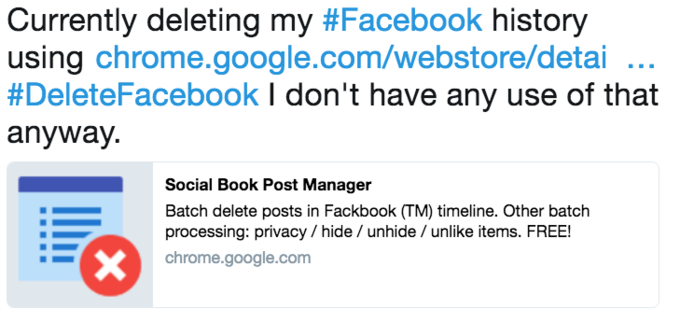
Elon Musk's Response
On March 20th, Tesla founder Elon Musk responded to a #DeleteFacebook tweet. During the course of the conversation, Twitter[22] user @serdarsprofile tweeted," Delete SpaceX page on Facebook if you're the man?" Musk responded, "I didn't realize there was one. Will do." The post (shown below) received more than 3,400 retweets and 18,000 likes.
Later in the thread, another user asked him to delete the Tesla Facebook page as well.[23] He agreed and said, "Definitely. Looks lame anyway." The post (shown below, right) received more than 1,500 retweets and 11,000 likes in three days.


"Psychographic Profiles"
According to reports the information obtained by Facebook was used to build psychographic profiles. These profiles examined IQ, agreeableness, political views and personality traits, breaking users into five categories:[17]
"militarism" -- guns and shooting, martial arts, crossbows, and knives
"violent occultism" -- drugs, black magic, paganism
"intellectual activities" -- singing and making music, foreign travel, the environment
"credulousness" -- the paranormal, flying saucers
"wholesome interests" -- camping, gardening, hill-walking
Shutdown
On May 2nd, 2018, Gizmodo[24] reported Cambridge Analytica would be "shuttering the business" after the board of directors for the parent company SCL Group found that "rebranding" would be "futile." That day, SCL Group founder Nigel Oakes confirmed the shut down in a statement to the Wall Street Journal.[25] Also on May 2nd, SCL published a press release that the company would commence "insolvency proceedings" and release the results of an internal investigation into the controversy.[26] Meanwhile, posts about the shutdown reached the front page of the /r/worldnews[27] and /r/politics[28] subreddits.
Media Coverage
In addition to reports by the Times and the Guardian, virtually all major media outlets covered the story, including CBS,[6] NBC,[7] Gizmodo,[8] ABC[9] and more.
Related Memes
Zucked
Following the Cambridge Analytica story, some online began using the Zucked to express Facebook's privacy regulations (example below, left and center).
On March 25th, Redditor[20] danorankia posted a variation of the He Protec meme with the three parts "he Zucc," "he cucc," "Yo Private Data… He Abducc." The post (shown below, right) received more than 4,500 points (93% upvoted).



Search Interest
External References
[1] The New York Times – How Trump Consultants Exploited the Facebook Data of Millions
[2] The Guardian – The Cambridge Analytica Files
‘I made Steve Bannon’s psychological warfare tool’: meet the data war whistleblower
[3] The Wall Street Journal – Mueller Sought Emails of Trump Campaign Data Firm
[4] Facebook – Suspending Cambridge Analytica and SCL Group from Facebook
[5] YouTube – Cambridge Analytica Uncovered: Secret filming reveals election tricks
[6] CBS – Report: Cambridge Analytica tried to block exposé by U.K.'s Channel 4
[7] NBC – Hidden camera shows Cambridge Analytica pitching deceptive tactics
[8] Gizmodo – Authorities Seek Warrant to Raid Offices of Cambridge Analytica Amid Facebook Data Showdown
[9] ABC – Trump-linked analytics firm Cambridge Analytica used stolen data, ex-employee says
[10] Cambridge Analytica – Cambridge Analytica responds to false allegations in the media
[11] Cambridge Analytica – Cambridge Analytica responds to use of entrapment and mischaracterization by Channel 4 News
[12] The Guardian – 'Utterly horrifying': ex-Facebook insider says covert data harvesting was routine
[13] Time – Want to Delete Facebook? It Could Take Up to 90 Days
[14] The Verge – How to delete Facebook
[15] TechCrunch – #deletefacebook
[16] CNN – Fed up with Facebook? Here's how to protect your data
[17] Business Insider – #DeleteFacebook is trending because Facebook users are livid about the poor handling of Cambridge Analytica's data harvesting
[18] Facebook – Mark Zuckerberg's Post
[19] The Onion – Mark Zuckerberg Promises That Misuse of Facebook Data Will Happen Again and Again
[20] Reddit – What the Zuck
[21] Twitter – @brianstelter's Tweet
[22] Twitter – @elonmusk's Tweet
[23] Twitter – @elonmusk's Tweet
[24] Gizmodo – Cambridge Analytica Is Shutting Down
[25] The Wall Street Journal – Cambridge Analytica Closing Operations
[26] CA-Commercial – Cambridge Analytica and Scl Elections Commence Insolvency Proceedings and Release Results of Independent Investigation into Recent Allegations
[27] Reddit – /r/worldnews
[28] Reddit – /r/politics
[29] Facebook – An Update on Our App Investigation and Audit | Facebook Newsroom
[30] Facebook – How can I tell if an app may have misused my Facebook information?


